Musical Youth pt. 4: Young Sound Systems
In the second instalment of the Musical Youth blog series we saw how, from the 1950s to the early 1990s, reggae sound systems provided a refuge for first and second generation African Caribbean communities in the UK who were facing racism and persecution in wider society. After a hiatus during the rise in electronic music, it wasn’t until the 2010s that a new generation of reggae sound systems was born, established by operators such as Young Warrior, son of Jah Shaka, launching in 2011. Many newcomers were inspired by Channel One, crowned winner of Red Bull’s Culture Series in 2010 and “arguably [creating] a renaissance in sound system culture for a younger, whiter generation in the UK.” [1] Series author Becca Leathlean asks two generations of young UK sound systems about their music and message.
by Becca Leathlean
—
CAYA, established 2016.
Thali Lotus (33) was inspired by Channel One to start her own sound system.
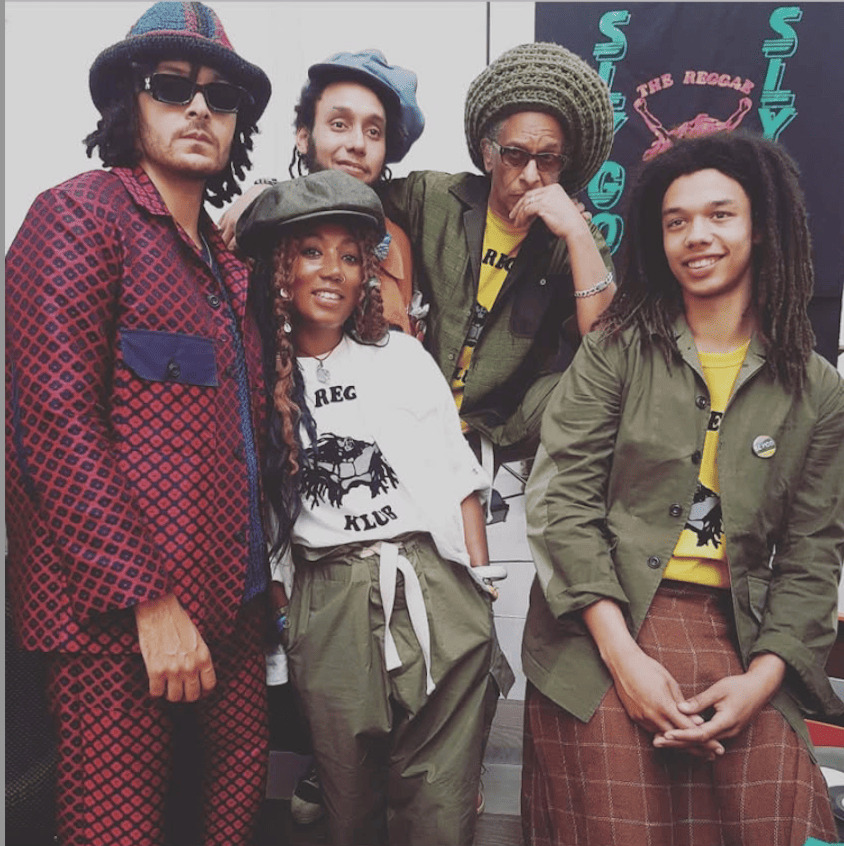
Thali Lotus at London Fashion Week 2019 (L-R) Yussef Dayes, Thali Lotus, Nicholas Daley, Don Letts, Cosmo Pyke.
“I was at Notting Hill Carnival with a sistren of mine. We were at Channel One, immersed in the music, the place and the people. The feeling was immense, and that night I dreamt I had a sound system.
“CAYA stands for Come As You Are. It’s a hub that allows everyone to come together, be they Black, White, tall, short, Hindu, Rasta. Before, I think sound system belonged to a set group of people. I believe I brought a new sort of feminine energy – less competitive and more about being educated by the music, the history, the sound and the harmony it brings.
“I designed the sound system, and it was built from scratch. It’s a four-way made up of bass scoops and a combination of 15s and 12s, plus tweeters and horns. Speaker-wise, the stack is 12 boxes. The sound’s important, but also accessibility, in that I am a one-woman band.
“I play a mixture of old and new roots, 90 percent vinyl and 10 percent CDs. I feature my peers, like Young Warrior, Prince Jamo, King Alpha and Empress Shema along with Aba Shanti-I, Channel One and Blacker Dread. In terms of earlier music, it’s classic roots and dub.”
Thali played around 40 gigs over the five years that CAYA was at its busiest. She’s also taken the sound system into schools and collaborated with an impressive list of partners to raise the profile of sound system culture. These have included the Boiler Room, British Library, Museum of London, Goldsmiths, Somerset House and London Fashion Week where, booked by the designer Nicholas Daley in 2019, she was the first sound system ever to take part.
“Looking back, it was as if everything the elders had done culminated into this time when we were able to springboard and do what we wanted,” says Thali. “They laid the foundation, and we now have the opportunity to do something new. As a result, the counterculture has started moving into the mainstream.”
CREATION REBEL, established 2018.
Tudor Lion (33) launched Creation Rebel sound system after coming up through Channel One.
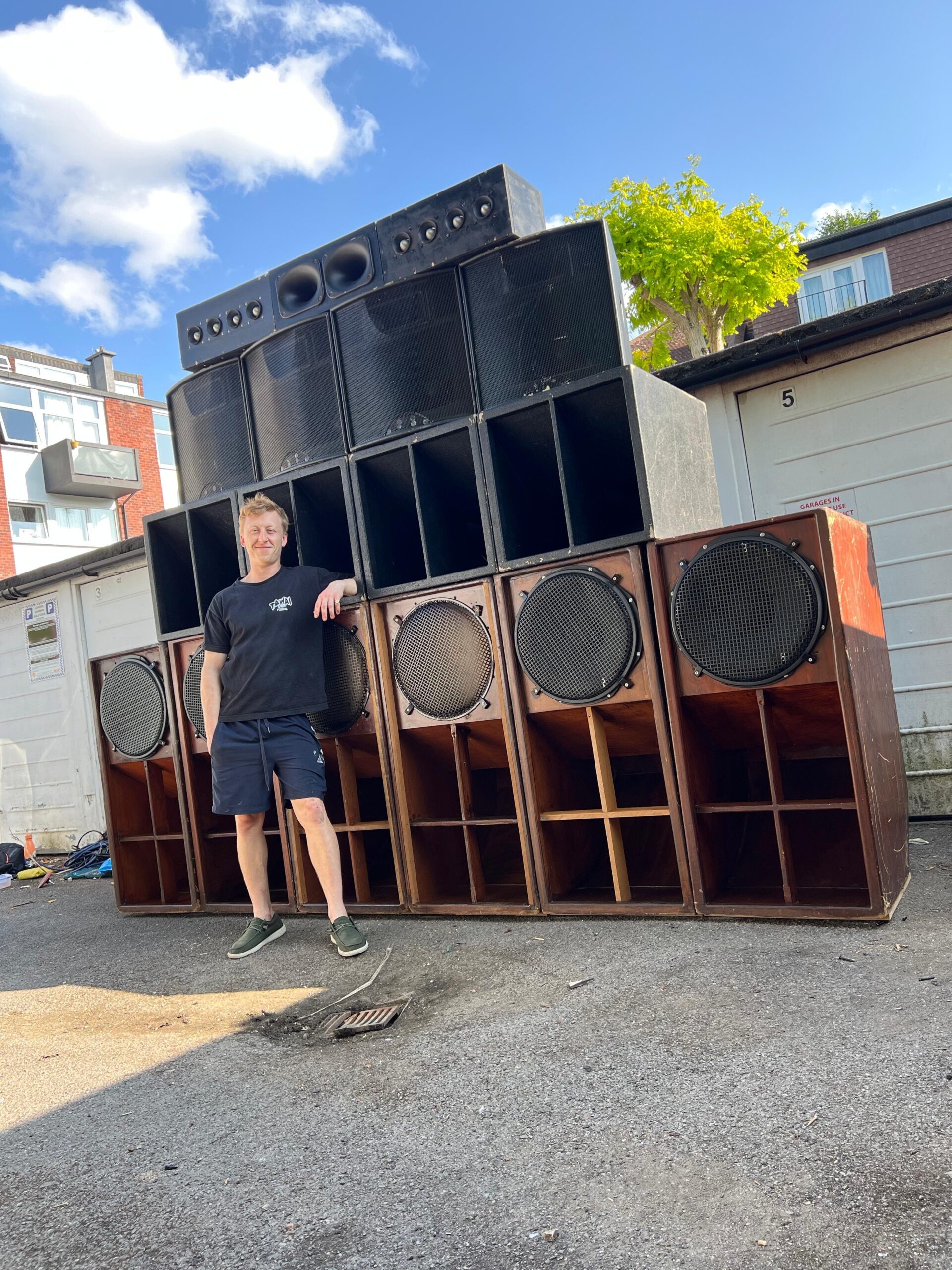
Tudor Lion with his own sound system Creation Rebel.
“I was introduced to reggae by my neighbours as a young teenager. They had a beautiful hi-fi and the mix and quality of their music opened up a path I kept going down.
“It was the mid-2000s. Artists like Jah Cure, Gyptian, Junior Kelly and Luciano were big, and I was getting a more spiritual message from the Abyssinians, Johnny Clarke and others. I was still only 14 or 15, but my friend told me I had to go the University of Dub to see Aba Shanti-I.
“The night I went, there was a bouncer who pulled me off the queue to get me in and came up to me when I left at 6am to ask how it went. It was like it was meant to be.
“That first night I saw Aba Shanti-I, Channel One and Jah Tubby. I went back whenever I could. One night I bumped into Channel One’s manager. She said they needed extra hands and gave me Mikey’s number. It carried on from there.
“My parents weren’t into reggae. My mum was quite fearful of it, but joining a sound system saved me. I wanted to drink, smoke and do everything I shouldn’t, but the guys were very clear. They’d say, ‘have a beer but don’t be drunk; dance but respect other people’s space; have a spliff but don’t take X or Y. It simplified life.
“I was happy doing anything for Channel One – flyering, carrying boxes, setting up the sound. They’re quite serious guys, you didn’t ask too many questions. But for some reason it clicked. We’d go out twice every weekend. It gave me a sense of purpose.
“When I started Creation Rebel, Mikey gave me some of his bass bins, mid-range and tops. Then a mate put me in touch with a guy who was looking to get rid of his sound. It was the right person at the right time. We struck a deal and now he’s one of my best friends. He’s also an excellent sound engineer and really helped me in terms of quality.”
Joined by toaster Ras Terry Gad, Tudor plays a mixture of Foundation tracks alongside contemporary roots artists. “I love Burning Spear. You can never go wrong with him, or Johnny Clarke. I love Dahweh Congo, a more modern Jamaican singer. And I like the Disciples, real pioneers of UK dub, plus Gussie P and Mafia & Fluxy. They have a nice modern take on roots. They mix in steppas, but it’s less digital and a beautiful middle ground. They also make re-licks of old Foundation tunes with a slightly more up-tempo style. You can feel that nice energy in the dance.”
As well as running the sound system, Tudor brings international acts to Brixton’s Hootananny, such as Marcus Gad and Tribe, the Twinkle Brothers and Al Campbell. Creation Rebel is also a record label (launched 2020) releasing work by excellent young acts such as the Gyrators and Jojo Gladstone.
“It’s a good way of preserving the legacy of reggae,” says Tudor. “These artists are keeping that old school, analogue feel alive, with everything live-recorded. Hopefully it will stand the test of time.”
SISTERS IN DUB, established 2021.
Sisters in Dub are a women-led sound system collective composed of Danniella Dee (28), Cherelle Harding (35) and DJ Kat the Katalyst (31).
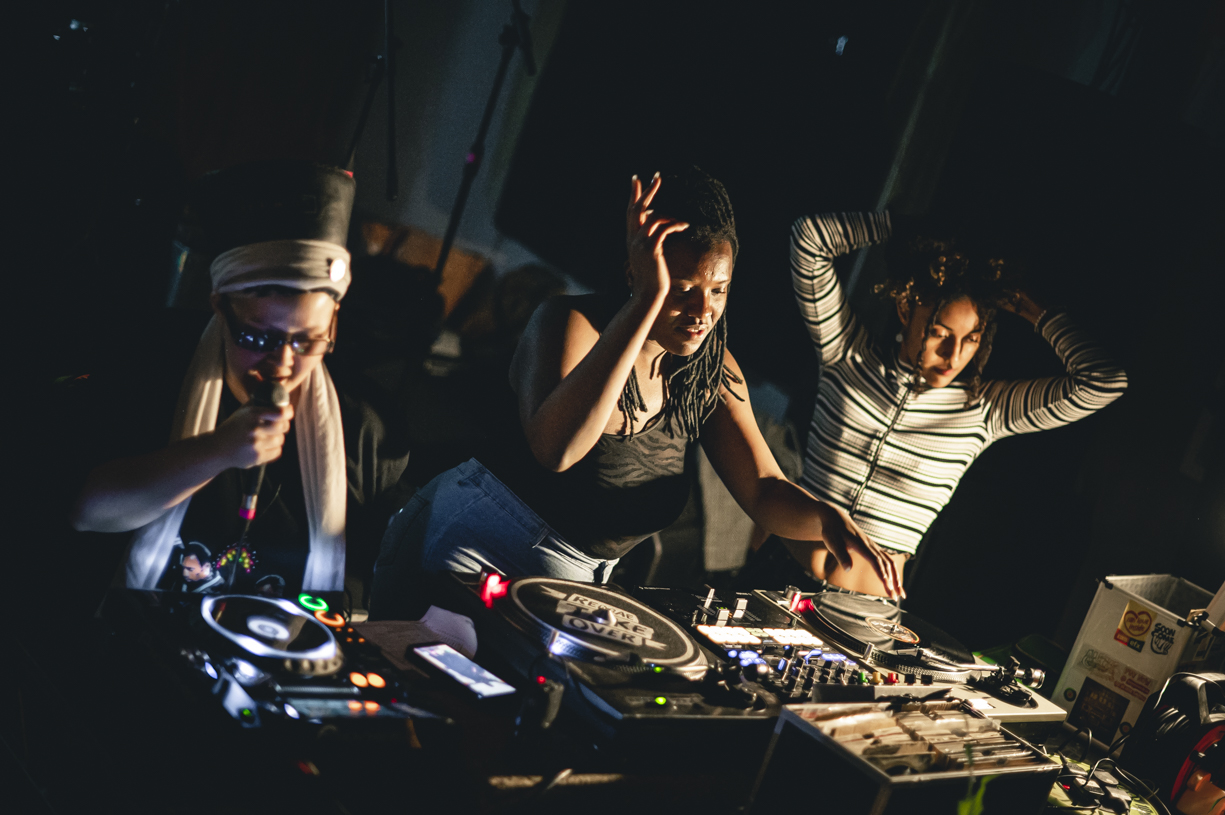
Sisters in Dub include singing and live instruments in their act.
Coventry natives with backgrounds in Grime, Gospel, spoken word, ska, reggae, djembe, poetry and broadcasting, the trio came together to host dub sessions in their hometown before entering a sound system competition for Coventry City of Culture in 2021. To their surprise, they won, and their subsequent rise has been exponential.
“We didn’t even have a sound system, but our passion for the music drove us,” says Kat.
“We incorporated vocals, instruments, all different things so it wasn’t just selecting music. People weren’t expecting it.”
Soon after, the trio were invited to play at a virtual dance with a live link-up to Jamaica, where Beenie Man was among the performers. Directly after that, they took part in a sound system build-workshop at Coventry’s Herbert Gallery with Black Obsidian Sound (B.O.S.S.). [2]
Says Cherelle: “B.O.S.S. wanted to donate the finished sound system to a local sound collective and they chose us. The first song we played on it was Satta Massagana by the Abyssinians. That was the moment it became real.”
Three years on, the Sisters have played all over the UK and Europe, including at Chaka Khan’s Meltdown at the Southbank in 2024.
Says Cherelle: “We showcase music that references the three of us. We’ll always play dub, but we’re from the city of 2 Tone so we might have a ska section. We’ve got a Specials remix in dub. Personally, I’m into deep roots and love it when it’s the right crowd for that.”
Sisters in Dub are keen to attract more Black youngsters to their gigs.
Says Cherelle: “You rarely see Black youth at dub events, and one of my passions is to encourage them in. Some of the music out there isn’t very positive, whereas dub can be a healer. It’d be great to see more Black youth knowing this is their heritage.”
The crew worry that the history and message of reggae could be forgotten.
“It’s a Catch 22. Reggae and Caribbean culture are so open and loving – everyone is invited. That’s a great aspect, but sadly not everyone is for protecting and preserving the music,” says Cherelle.
Says Kat: “Sometimes people come to festivals to jump around and enjoy the rhythm rather than listen to what’s being said. We need people to enjoy themselves but at the same time remember the history and the legacy we want to preserve. When we’re on stage, I will remind them that what we play has a message.”
“People’s entry points to the music are key,” says Cherelle. We might play something, and it doesn’t hit – but maybe someone else plays it on TikTok and it hits because young people are getting it in a way that resonates with them. You’ve got to be creative with your approach.”
To this end, Sisters in Dub are keen to work with more young performers.
“We’ve built up a kind of roster,” Kat laughs. Adds Cherelle: “There’s Jonno who plays the trumpet, and g3nna (23) who MCs and raps. It’s great to give them the opportunity to play to festival crowds. We did a Palestine Fundraiser last year and there was a young lady playing steel pan. Perhaps we can bring her along and share her work.
“I also think artists like Protoje and Lila Ike are setting a good example. You can hear reggae and hip hop in their music. I think it’s a great way to bring people to a message.
“Not all the elders appreciate that young vibe, but if young people aren’t embracing the sound by adding their own thing, who continues the legacy? I feel we must bring them in, in all ways, because they are the future.”
Sisters in Dub recently played at City Splash where they were also part of the @HouseofDread Rastafari Corner. We’ll be hearing more from them in the fifth and final blog for SST, which will consider hopes and fears for the future in terms of protecting the legacy of reggae.
EARTH FREQUENCY SOUND, established 2018.
Wilf (27) and Flo (26) started their sound system as undergraduates at Sheffield University, playing gigs for the Reggae Society, which they founded.
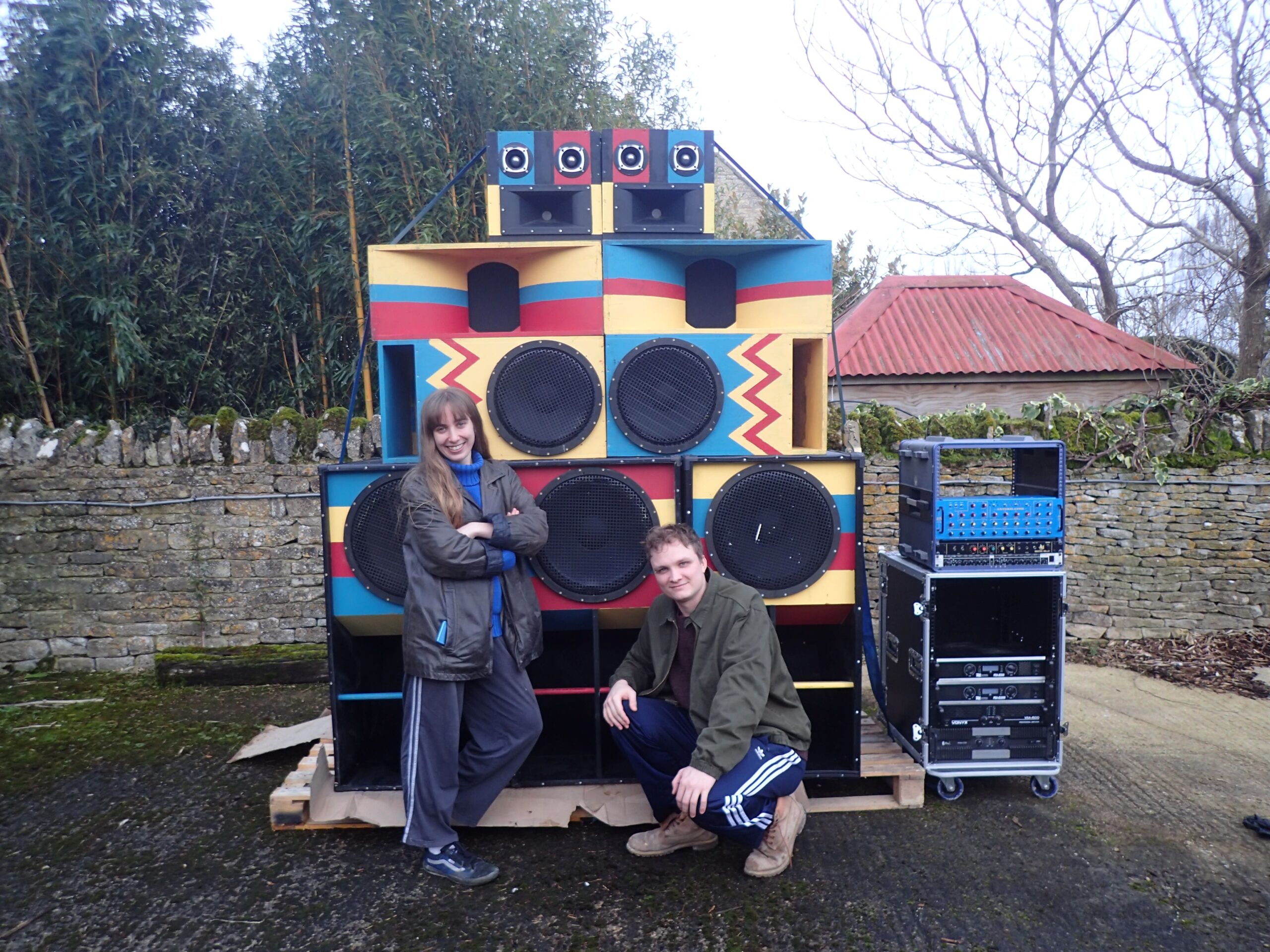
Wilf and Flo were inspired by Ghanaian Kente cloth when they painted their boxes. The pattern they chose means ‘unity is strength’.
Wilf says: “I was brought up in Oxfordshire, but I’ve always been into the older reggae music. My dad had eclectic taste – I was listening to a lot of Gladiators and there was a great Duke Reid compilation. My auntie was a reggae fan, too. I’d visit her in London and listen to Studio One, roots and dub.
“Living in Oxfordshire, I was disconnected from the reggae scene. So when I got to Sheffield I was determined to get involved. We founded the Reggae Society in the first year and built the sound in the summer going into our second year.
“I built the first set of boxes with help from my dad who is a furniture maker. We painted them with a zigzag design, inspired by Ghanaian Kente Cloth. The design I chose, the Nkyemfre pattern, translates as ‘unity is strength’. I wanted the boxes to be colourful, because a big part of Sound System is that it’s a physical object. Everything about it should be a stamp of your personality.”
Flo says, “As well as the Reggae Society, we played at house parties and bars. We were using digital music at that point. We started collecting vinyl after we graduated.”
Wilf says, “We finished Uni during Covid, and built new boxes during Lockdown. But we didn’t get Earth Frequency out again until we moved to London in 2022.
“In London, we met people through Lion Vibes record shop and got a regular night at Lucy 1st in Stockwell. Shaggsy Dan joined us, and we invited Ruddy Nunes, Skanking Star, Lady Issachar and Dubplate Pearl to play.”
The crew now focus more on festivals, and are currently organising a day/night party at Distillery N17 on 9 August in collaboration with Awake All Hours. The event will mix dub and roots on vinyl with dub-influenced electronic music to showcase the evolution of sound system culture.
In terms of preserving the reggae genre, Wilf and Flo think a hybrid approach may be best.
“Some of the best nights we’ve done have been dub and jungle, or dub and dubstep,” says Wilf. “Something really nice in Sheffield was the cross pollination between the different genres.”
Flo, who also DJs electronic music in her own right, came to reggae through jungle and bass music. She agrees that combining different genres is the best way to make reggae more accessible.
“It’s hard to speak on, though,” says Wilf. “Reggae is such a cultural music, I wouldn’t want to make any proclamations on legacy. Just from experience, you get more people involved at hybrid events.”
BRIXTON DOWNBEAT, established 2023.
Ruddy Nunes (22) and George Younger (23) founded Brixton Downbeat after inheriting ‘the Mighty De-gentrifiyah’ from Ruddy’s boss, Jah Lingwa of Universal Roots record shop. Setting a new trend in terms of young sound systems, they refuse to play steppas or new roots (with a few exceptions) priding themselves on a local/community ethos and regular collaborations with veteran sound systems at their monthly night in Stockwell.
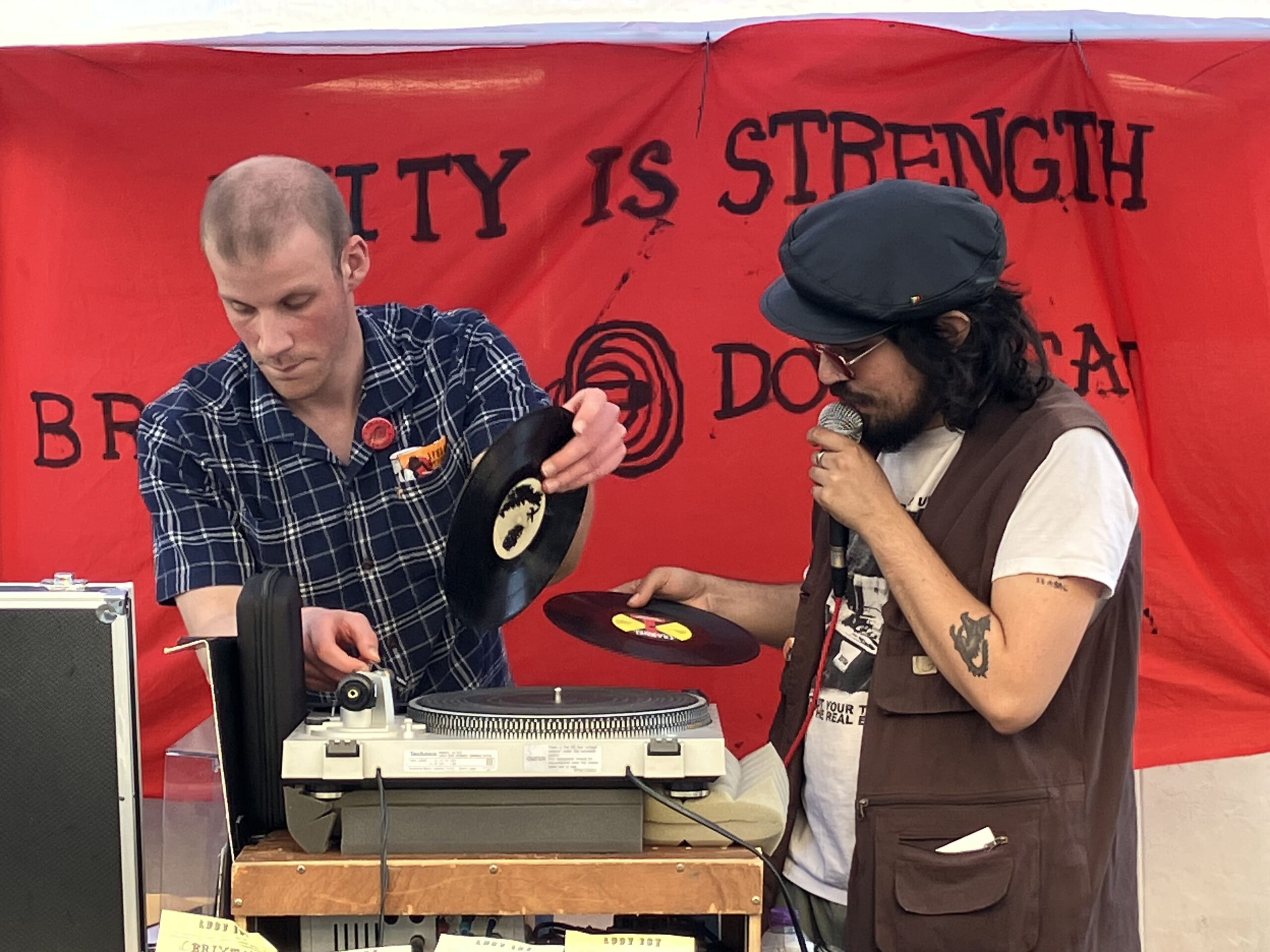
Brixton Downbeat’s founders George (L), Ruddy (R).
The pair were inspired by events at Brixton’s Street Gym in Somerleyton Road, where there used to be a sound system night every month. Nights were hosted by two sound systems at a time, with selectors like Rasta Queen and Master B running heavy roots.
“It was the closest thing we had to the old sound system culture of the 80s which would have been held in a community hall, with sounds from the area and sometimes out of town playing,” says Ruddy. “It was affordable – just £5 on the door. It was a proper community dance and it made me think I’d like to do something similar.”
When the Street Gym stopped its sound system events, Markie [Jah Lingwa] started a night in the Brixx bar on Electric Avenue, wheeling the De-gentrifiyah there on a trolley. “I’d been playing tunes in the shop, so Markie asked me to help him run the night,” Ruddy says. “George works for Markie’s partner in Pure Vinyl and for Markie’s birthday we invited him to play. It was the first time we’d played together, and it worked.”
Universal Roots closed in August 2023 and, with nowhere to store it, the De-gentrifiyah was gifted to the lads. It was reborn as Brixton Downbeat (BDB) a few months later at the start of their current residency at Lucy 1st. New boxes have since been added.
As well as selecting, Ruddy is BDB’s mic man, with an entertaining style and seemingly natural ability to make the words flow. “Markie encouraged me,” he says. “I’m still learning but, along with the boxes, a big part of a sound’s identity is the MC.”
And of utmost importance to the team is the sound’s traditional, community ethos. “We use only one turntable, it’s strictly vinyl and we play only old music,” says George.
“Most old reggae is played by a group of musicians; you can feel how they’ve come together to create something amazing. Whereas a lot of the steppas stuff now is made by one guy in a studio and is more about production values and how loud the bass is. Some modern sound systems are the same – just focusing on how they can get the most bass through.
“For us, the sound quality is the most important thing, not the volume.”
Growing up in the area and working in Brixton record shops, the lads are acutely aware of the living history around them in terms of the original soundmen they have got to know and invite in to play.
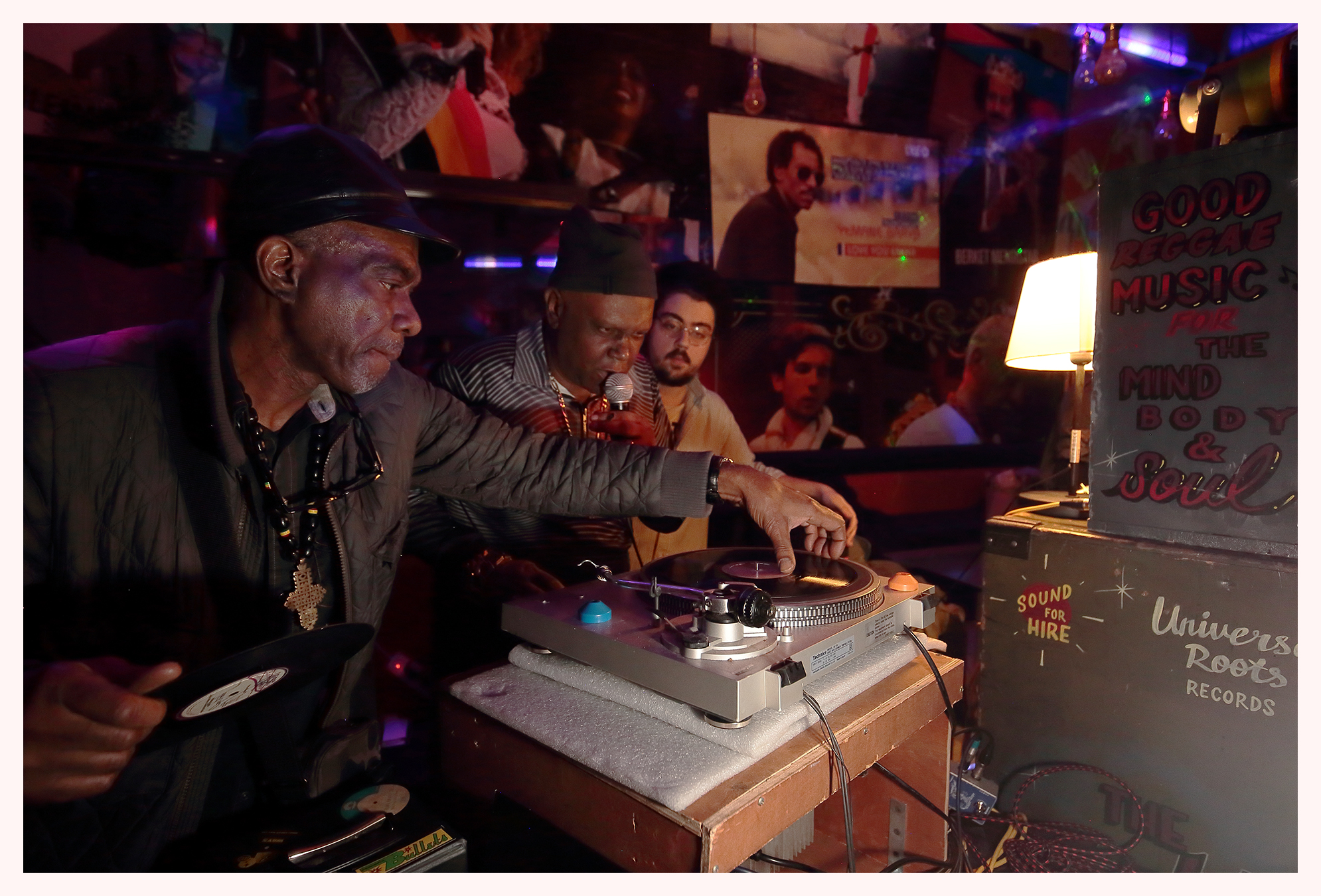
Ruddy with Jucks and Riccus from Buchanan Sound. The lads often invite elder sound systems. Image ©maexhair @JetBlakInk
“Recently, we invited Buchanan for the second time. They’re an old-time sound – Smiley Culture and Asher Senator were their mic men back in the day. It was an honour to have them with us,” says George.
“A golden moment came late that night when John Champian from Jamdown Rockers ran a Brixton Downbeat lyric on the mic,” says Ruddy. “Getting support from people like that, and others, like Moa Anbessa, is amazing.”
The dances attract good numbers of young people, as well as veterans. “We’re getting art students, people on the music scene and some locals,” says Ruddy. “It’s a very mixed crowd between elders and younger people and that’s something I feel very content about.”
ROCKING TIME HIFI, established 2024.
Just 19, Frank Black was introduced to reggae in 2019 by Afro-dub and reggae band The Soothsayers, when they did a music workshop at his school. After then playing bass with their youth band, the Youthsayers, he now has a reggae sound system, Rocking Time HiFi, which he plays at sold-out monthly gigs alongside his own Afro-dub band, Kotoa.
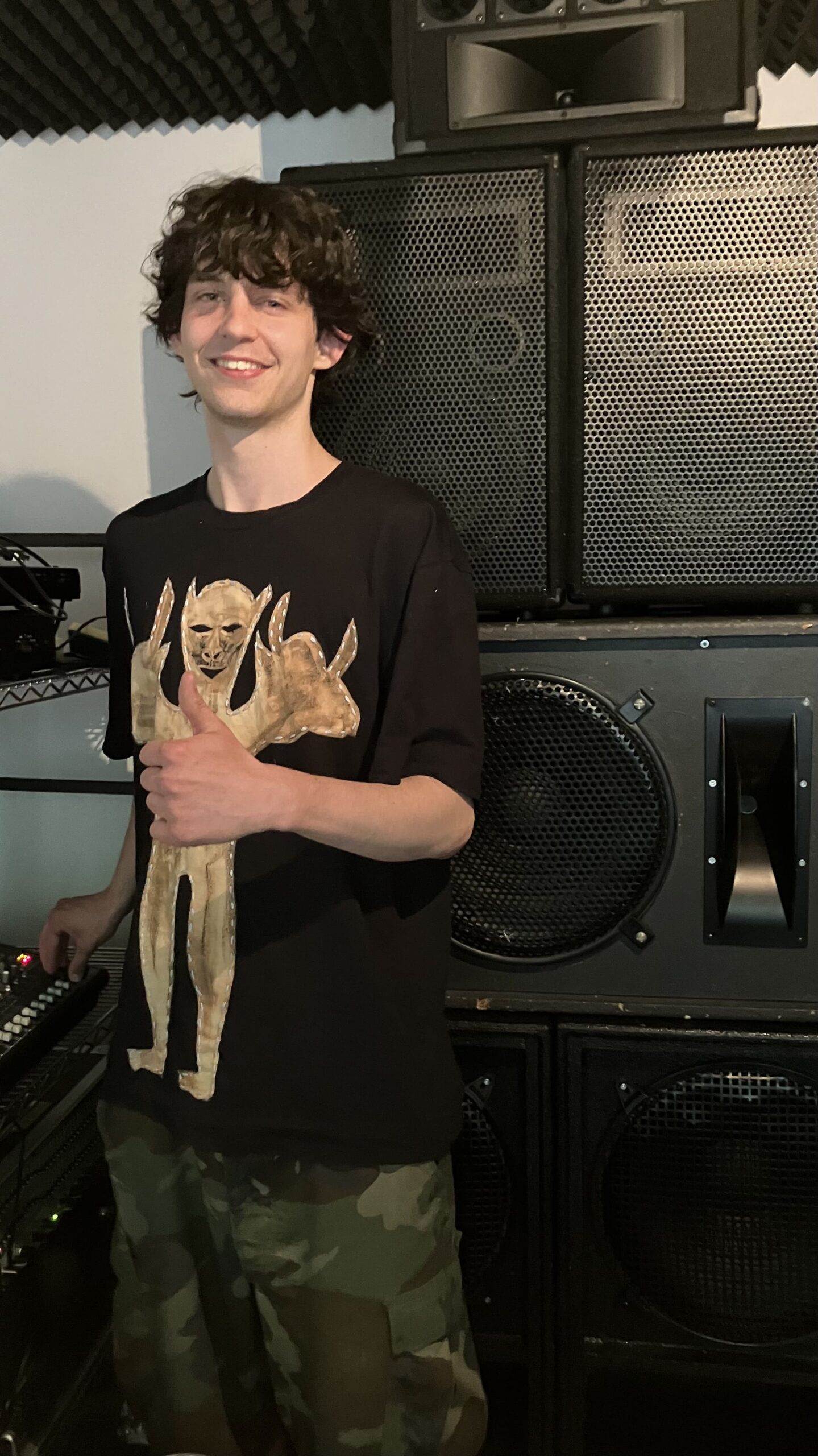
Frank Black has his own successful sound system at just 19 years old.
“I bought my first record six years ago,” he says. “It was Rastaman Vibration by Bob Marley. I hooked up my speakers to Dad’s record player and ran the tune. I bought all the Bob Marley records and then I discovered Lion Vibes record shop three years ago and started going every week. There were a couple of shifts going, and I started working there last year.
Kotoa (previously known as Canopy) was formed in 2023. The name means ‘all’ or ‘together’ in Tongan, inspired by their guitarist, Memphis, who is from the island. They built a following by playing at pubs and fundraisers, before getting a monthly residency under the arches in Loughborough Junction in November 2024.
“The band brings a young audience, and we want to keep sound system culture alive by running the sound after we play so people will stay,” Frank says.
“When we started, we played more new roots and steppas to attract a young crowd. I’d been going to Iration Steppas and I thought sound system was all about heavy bass and volume. But I now know it’s not what sound system originally was, and I don’t think it’s what it should be. Going to dances like Brixton Downbeat has opened my eyes to the fact that you can have a young audience who know the old music and celebrate it.
“My favourite track is Jah Works by the Gladiators, and my speciality is 70s reggae, specifically rockers, like Johnny Clarke, Barry Brown and the Revolutionaries with Sly and Robbie and the Roots Radics as backing bands.
“When I play a song, I explain to my friends what it’s about. I also tell them how to break apart the different musical components and how reggae works on different frequencies. The message is so important. It’s not a whitewashed version of Black history, its Black people telling us how their ancestors lived and how they were treated. If you didn’t have reggae, a lot of that story would be lost. Rastafari is a massive part of it, and also very important.
“For me, the music is about education and happiness. Reggae brings so much joy into the world, through its lyrics and melodies, basslines and drumbeats. I think it will forever be a part of British culture.”
From Millennials evolving sound system to bring the culture into the mainstream [3] and/or mixing vinyl roots with new roots and digital music, to Brixton’s Generation Z returning to the Foundation in terms of music, format and ethos, the legacy of reggae via sound system seems to be on a secure, albeit unpredictable path. One positive change is the number of women now involved. In the fifth and final ‘Musical Youth’ blog, we’ll meet young reggae singers, producers and broadcasters. We’ll also re-consider the role of Rastafari and the need to honour reggae history going forward.
Notes
[1] Dr Natalie Hyancinth, The Sound of Lewisham from the 1950s to Now, for SST.
[2] B.O.S.S. is a Black Queer/Trans-led sound system based in London.
[3] Recent and forthcoming examples include the Beyond the Bassline exhibition at the British Library and The Music is Black, coming to V&A East in 2026. Sonic Street Technologies is also writing a series of books, entitled Mobile Music Machines based on the five-year SST project and establishing sound system cultures as a valid new research area.
About the Author:
Becca Leathlean is a writer and teacher with a long-term love of roots reggae. She returned to London in July 2022 to take up opportunities as a vinyl DJ and to present a world-reggae radio show.
